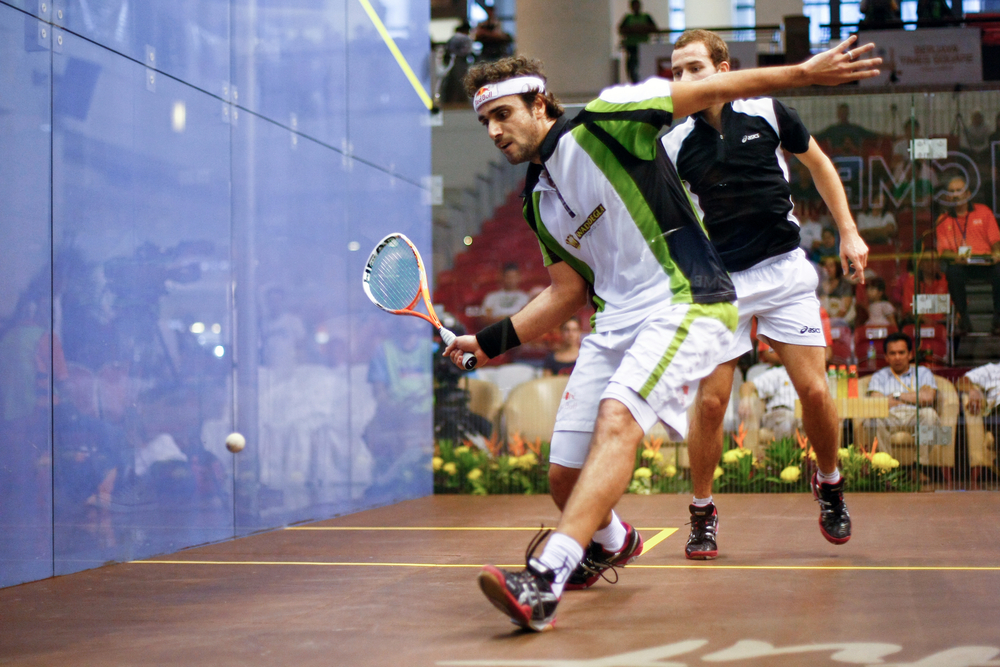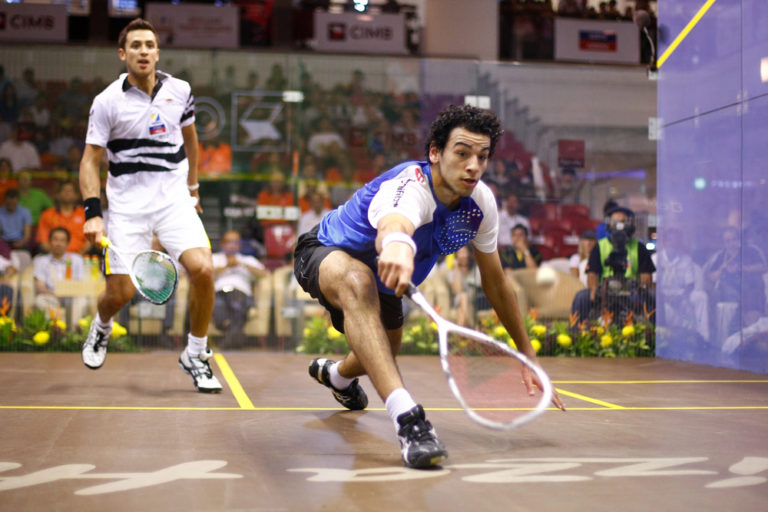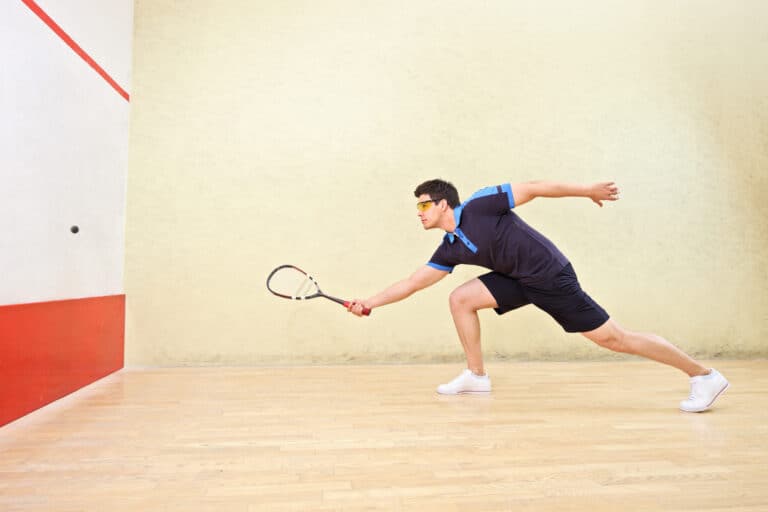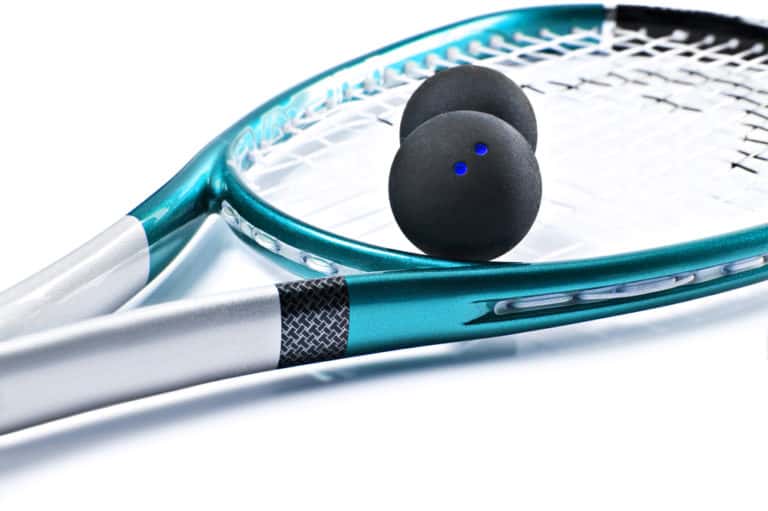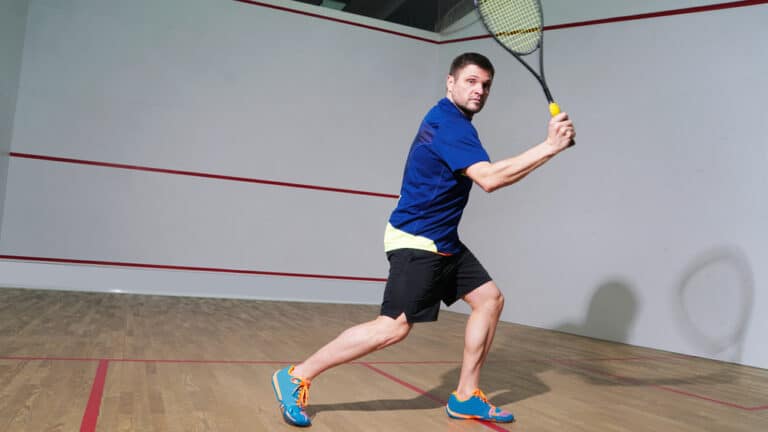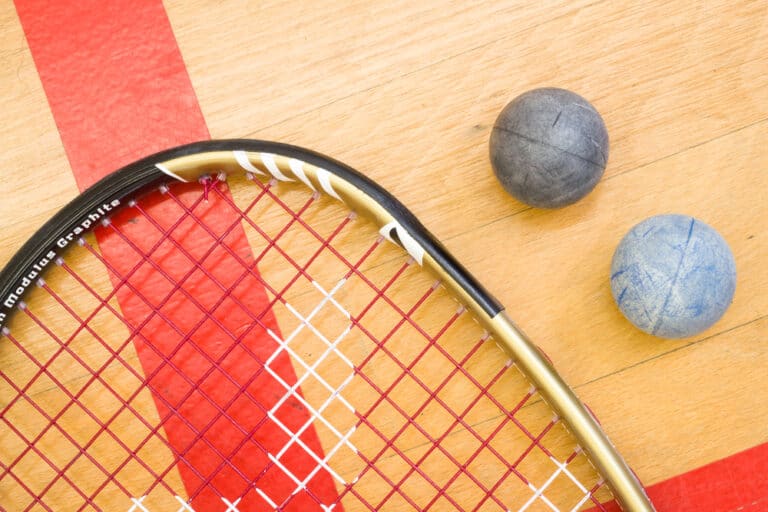How Do You Win At Squash?
To win at squash is about scoring more points in the game than your opponent, as in every other sport. However, doing this consistently requires a few additional skill-sets, not just technical ability and physical fitness.
Winning at squash requires dominance in five areas of the game: game plan, tactics, mental strength, physical conditioning, and technique. The match is won by the player who wins three out of five games or however the competition is structured, but winning points is just the beginning.
As a squash player, you need to have all of these five elements in your game and be able to use and apply them on-court to be victorious. Let’s get kitted up and get on the court and discover everything you need to win at squash!
How To Win At Squash – Winning The Match
Before we get into the game’s tactics, let’s first look at the game itself, the point rules and structure and set structure, and how you win a match; then, we will jump into the various areas of dominance you need.
A squash match is five games; the first player to win three out of five games wins the match. Games usually are comprised of eleven points, and the first player to score eleven points wins the game.
Games can also be fifteen points, and this format is often used with beginners and novices while the eleven-point game is for pros, but for the most part, all squash games, by default, are eleven points.
If both players are tied on ten points, then the first player to win by two clear points will win the game, so 12-10 or 13-11. Sometimes these games get tight, and they can go to fifteen points or more!
Depending on your squash fitness level, you may decide to extend the game to two sets or more, and each set has five games per the standard game structure. However, you can also make it that to win the set, you have to win five games instead of three, and this would be for endurance and stamina training.
Of course, you can make up any number of different types of games, but remember that in standard competition or regular recreational games, the common points and game structures would be in play.
Now that we have the basic game set and point structures covered let’s move into the strategic aspects of the game.
To Win At Squash, You Need A Game Plan
The game plan in squash is to dominate the ‘T’; this is the center of the court, which allows the player that holds this position to be the equivalent of having the high ground in military tactics.
Controlling the T gives you a massive advantage as you not only reach drop shots quicker or retrieve deeper shots off the wall with more time, but you can run your opponent around the court and set them up for a killer shot – whether a tight line drive or drop shot to win the point.
Dominating the T on the squash court requires you to understand where you can play the ball from your serve and rally shots to move your opponent out of position and allow you to dominate the center position.
The ability to control this key position will rely heavily on your skill and technique as well as your fitness, stamina, mental focus, and strength, which will give you the overall conditioning you need to dominate the T.
Your game plan also needs to include assessing your opponent’s strengths and weaknesses, whether they are a front or back-foot player, and where they are vulnerable, and then exploiting that to your advantage.
For example, you may find your opponent is a good line drive player who can pick shots confidently close to the wall but isn’t adept at reach drop shots, and you can only determine this once you have started playing.
Also, remember that your opponent will be doing the same and that he too has a game plan that will involve looking to dominate the center court, so it becomes a question of who can execute and implement their game plan faster.
To Win At Squash, You Need A Strong Mentality
The ‘mental’ game is a term bandied about in every sport these days, but it is as relevant in squash as anywhere else. Mental toughness describes your belief that you can and will win the game using your technique, being confident in your fitness, and confidence in your game plan.
The mental aspect has several components as you need to overcome on-court challenges that you may face without losing focus and confidence. One of the significant influences in the game is the officiating, and your mental state needs to be able to deal with the odd call against you.
If that happens, an on-court melt-down will not help you win; it will more than likely help you lose focus and the match, as you cannot play when you are unsettled. Part of this mental toughness is allowing yourself time to assimilate and assess on-court incidents and then move on.
Depending on where you play, you may find that the court is not in optimum condition, the lighting may not be what you are used to, your opponent may overstep or push rule definitions, or some 50/50 calls go against you from the officials.
All of these elements will test your mentality.
If you allow these to intrude and displace your focus, you will probably end up losing, and so you need to be able to accept these ‘ bumps-in-the-road’ without them upsetting you off your game plan. It takes practice and discipline to achieve and remain calm and focused even when it feels like the odds are against you.
Using the rules to your advantage to take a breath and refocus is an excellent strategy, so knowing that your opponent can only serve once you are in place and ready to receive, so taking a few extra seconds to recompose yourself and refocus is a way to get back in the zone and back on your game plan.
You Need Tactical Superiority To Win At Squash
Tactical aspects in squash are about moving your opponent around and putting them in positions where they are stretched and vulnerable, and you are not. You can achieve this in a few ways, and one of them is to play the ball early or get on the front foot.
Getting to the ball early requires speed and technique. Still, it also requires an ability to pre-empt and anticipate your opponent’s return shot. You can exert some control by placing your shots in areas where your opponent has limited options.
In doing so, you can limit the shot options and put yourself in a position where you can reach the ball on the front foot and keep your opponent on the back foot, making him play defensively and not allowing them to dictate the pace of the game.
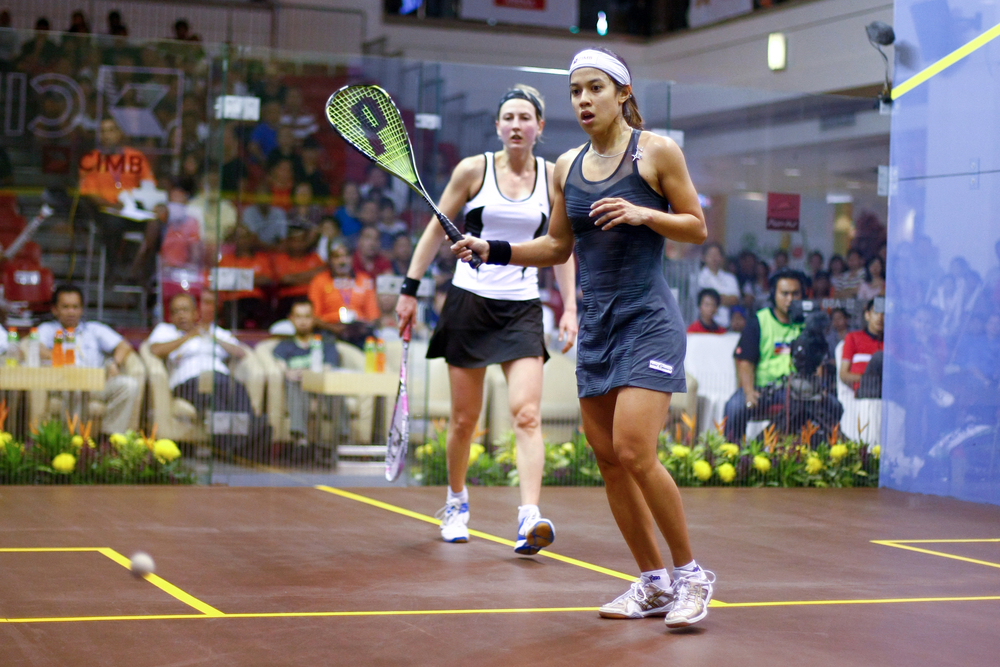
Use Your Tactical Shots To Win At Squash
Many squash players spend hours honing certain shots like the tight line drive, which is close to the side-walls and leaves little room for error when played correctly. Even at a professional level, the tight line drive dropping in the back corner limits the shot response and can set you up for a killer cross-court drop shot or similar winner.
Another element in tactical play is when to play your ‘bazooka’ and slow the game down and play lob shots to the back-court to allow yourself to regain center-court dominance. The ‘bazooka’ is the power line that drives any shot hit very hard and with high speed, forcing your opponent to react quickly.
The key to these types of shots is to know when to play them and when not to and that only comes with experience, but it’s like having a 100mph fastball in baseball – when you unleash it, you have to get a strike!
Slowing the game down where your opponents want a faster-moving match is another great tactic as nothing can frustrate an opposing player than having to slow down and wait for the ball. This can take them out of their comfort zone and result in you winning the war of attrition.
Squash is a game of attrition, more of a middle marathon rather than a 100m dash, and you need to know this before you get on the court. This is a best-of-five race, and even if you lose a few points or a game here and there, there are a lot of points to be played and time to play them.
You Need Stamina To Win At Squash
Squash is probably one of the fastest-moving court sports in the world, and as such, you need to be fit and strong to play a good game and win more often than not. While physical fitness is critical, other elements affect your stamina, including diet and hydration.
Stamina can be built up by playing squash with players at your level or higher. Playing against players that aren’t at your skill level will be good for them and can be of value as you can spend some time back in basics, which is never bad.
In terms of stamina, you need to be challenged in terms of your fitness and technique, as well as creating new strategies and adapting to a higher level of play, as this is the best way to improve your mental and physical stamina.
Taking on players that are better than you and looking to up your game and learn from them is an excellent tactic for improvement and one that you should never shy away from; it’s one you should actively pursue.
Even if you lose all three games, this type of training is not about winning but improving all the elements of your game.
If you are going to train outside of the squash court, then utilize training that is more similar to squash with its bursts of intensity and then periods of slow play so that HIIT training will improve your stamina and heart rate capacity is a good idea.
Building strength and muscle using weights will also be helpful, but be aware of using weights that are too heavy as developing a build similar to an Olympic weightlifter isn’t going to be of much assistance on a squash court.
To Win At Squash, You Need Good Technique
This is true of any sport, and proper technique is critical to success in squash. As with golf, baseball, and other racquet sports, there is a multitude of training and coaching videos available for free, as well as the option to engage with a coach to improve technique and all the other aspects of your game.
If you are struggling with a particular stroke or execution of a shot, it would be a good idea to ask a senior player to spend ten minutes with you to assess your technique, as you often find that minor tweaks can make a huge difference.
In the same vein, as a beginner, it would be advisable to spend some time learning proper techniques, as once this aspect of your game is entrenched, it makes the rest of the game that much easier as you are technically competent in your execution.
The technique is about achieving proper grip, the correct shot technique for line drive, whether forehand or backhand, drop and lob shots, and power shots. Your equipment should also be assessed to ensure it matches your skill level.
Always use a racquet suited for your skill level, use a good quality grip and ensure you have the correct color squash balls for bounce and speed for your game. There is no benefit to using competition-level squash balls as a beginner or vice versa!
Conclusion
Aside from all the aspects discussed, you need the will to win and the drive to succeed, and this means putting in the time to train, get fit, build stamina, strategy, and technique, and all of that will take time.
Winning is not the only thing in any game; it’s about sportsmanship, participation, and enjoying the game, but winning is better than losing! So if you want to win at squash, believe you can know you will, and the rest will fall into place!

